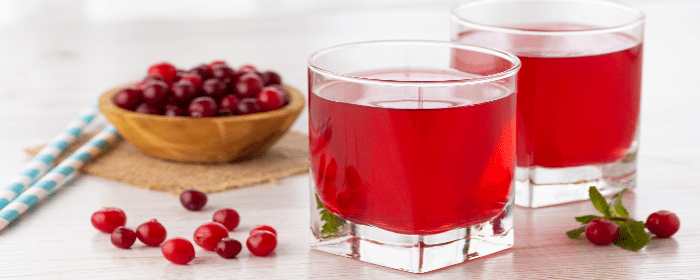Cranberry juice isn’t the most common beverage choice, but many people enjoy it due to its health benefits. The U.S. is the world’s leading cranberry producer, with Wisconsin having produced more than four and a half million barrels of the tart fruit in 2019. The berry grows on vines and thrives in damp conditions.
One of the widest-held beliefs about cranberry juice is that it can help prevent or treat UTIs. This is due to the drink’s rich concentration of active ingredient A-type proanthocyanidins, which helps to prevent bacteria such as E. coli from sticking to the bladder wall. While it’s unclear whether the concentration of the active ingredient is high enough to treat or prevent UTIs, drinking the juice certainly won’t hurt.
As an added bonus, cranberry juice has many different vitamins and minerals, including:
- Copper
- Potassium
- Manganese
- Magnesium
- Calcium
- Folate
- Vitamin K
- Vitamin B6
- Vitamin B3
- Vitamin B2
- Vitamin B1
Cranberry juice is also loaded with vitamin C, a powerful antioxidant that can help minimize cell and DNA damage caused by free radicals. As a result, it could aid in the prevention of cancer, heart disease, and other conditions. Vitamin C also aids in the production of collagen, promotes healing, helps the body absorb iron, and supports the immune system.
Another standout antioxidant found in the juice is vitamin E, which is important to heart, skin, and blood vessel health. Additionally, anthocyanins in cranberry juice can help prevent the hardening of the arteries and prevent heart disease by promoting healthy blood pressure and cholesterol.
While the benefits of cranberry juice are clear, it should be enjoyed in moderation, and juice with added sugar is best avoided. Additionally, it could cause problems with blood thinners, so anyone on these medications should speak with their doctor.
For more health awareness blogs, please visit www.stemedix.com/blog.


 St. Petersburg, Florida
St. Petersburg, Florida
